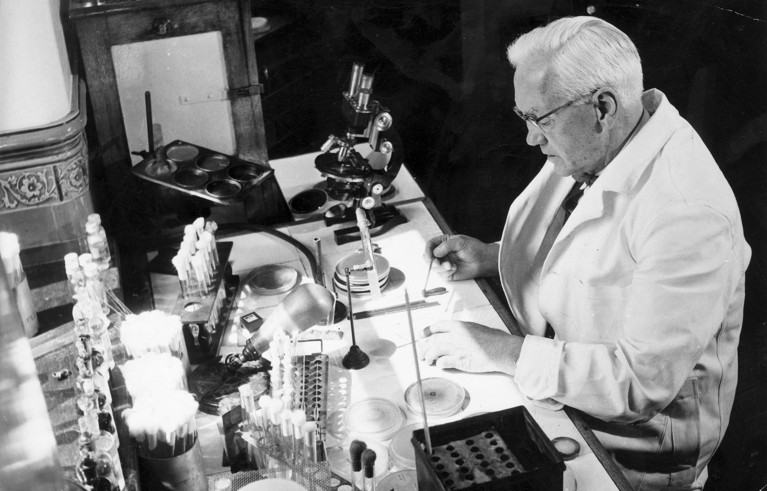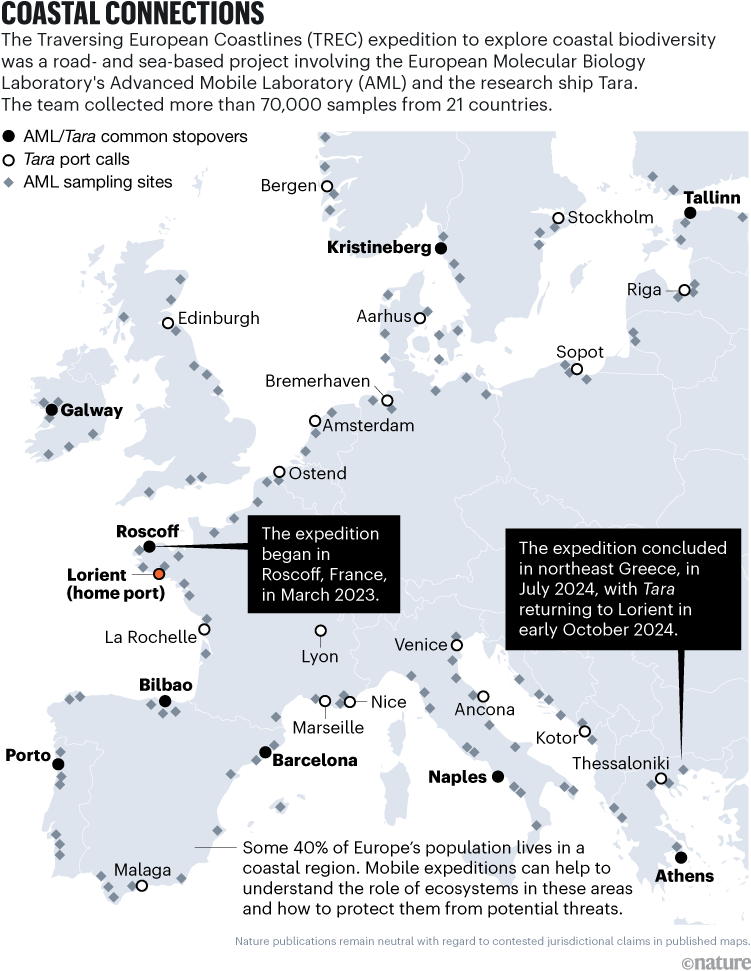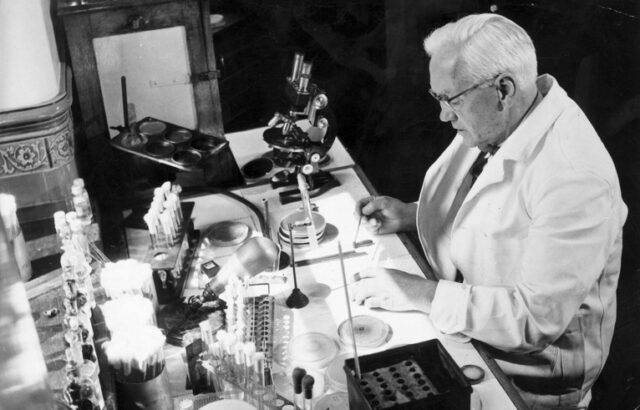Hello Nature readers, would you like to get this Briefing in your inbox free every day? Sign up here.

Alexander Fleming famously observed that a stray mould from the genus Penicillium prevented bacteria in a Petri dish from growing.Credit: Chris Ware/Keystone Features/Getty
Around 70% of biomedical papers include serendipitous findings — outcomes the scientists weren’t expecting based on what they wrote in their funding applications. A research team trained a machine-learning algorithm to classify text in 1.2 million papers into scientific categories. They then compared the categories with those found in the aims and expectations of grant proposals to the US National Institutes of Health (NIH). Any paper with at least one category not mentioned in its grant was considered to contain something unexpected. Larger grants produced more chance findings, which suggests that if funders want to promote unexpectedness, they could award big grants given over long periods, says study author Ohid Yaqub.
Nature | 5 min read
Reference: Research Policy paper
More than 40% of postdoctoral researchers leave academia, according to a study of some 45,500 researchers’ careers. In many countries there are more postdocs than faculty positions available, which creates a bottleneck. Researchers found that postdocs who publish a ‘hit paper’ — one that is in the top 5% most-cited papers in its field in the year of publication — are more likely both to land academic positions and to produce highly-cited work early in their time in that position.
Nature | 4 min read
Reference: Proceedings of the National Academy of Sciences paper
A chemical engineer arrested in 2019 under the controversial China Initiative, which aimed to protect US laboratories and businesses from espionage, is suing his former university. Feng ‘Franklin’ Tao is demanding that the University of Kansas return him to his position as a tenured professor and pay his lost wages, his attorneys’ fees and damages for emotional distress and injury to his reputation after being cleared of all charges. The move comes as US researchers of Asian heritage wait anxiously to see whether newly-inaugurated president Donald Trump will revive the contentious initiative.
Nature | 6 min read
A slew of executive orders signed by US president Donald Trump on his first day in office indicate where he plans to steer the country. Those most relevant to science include declaring a ‘national energy emergency’ that could boost fossil-fuel use. The orders also confirm his intention to pull the US out of the World Health Organization, and to cut the size and power of the federal workforce, which includes roughly 280,000 scientists and engineers.
Nature | 7 min read
Before leaving office, former US president Joe Biden blocked the succeeding administration from prosecuting public-health leader Anthony Fauci. As the face of the country’s response to COVID-19, Fauci had become a lightning rod for accusations that created “immeasurable and intolerable distress for me and my family”, he said in a statement thanking Biden. But another scientist caught up in the political firestorm, conservation biologist Peter Daszak, was banned from receiving any government funding, as was the non-profit organization he headed, EcoHealth Alliance.
Science | 4 min read
Features & opinion
The outlook for managing menopause is starting to change. After decades of neglect, research funding is on the rise and physicians are seeking out education on the topic. Some researchers are revisiting hormone therapy — which fell somewhat out of favour owing to a misinterpreted study that prompted fear of its use — and the optimal time for treatment to start. Others are exploring the benefits of stalling the onset of menopause.
Nature | 11 min read
Patchy, short-term health data obscure the true burden of climate change-related death and illness in current impact assessments, argues climate scientist Dann Mitchell. The reports must take into account the toll that long-term exposure to heat and drought will have on our bodies. Researchers need to consider how community health is affected by warming conditions and study the socio-economic impacts of recovering from climate disasters. “Once we do this, we will see that the health burden of climate change is much larger than we have realized,” says Mitchell. “This will add to the pressure to limit climate change.”
Nature | 5 min read
How do you solve a problem like damaging delicate specimens when transporting them back to your lab? Easy, you take your lab to the specimens. Mobile labs can be as simple as portable box-based equipment, or as grand as the Advanced Mobile Laboratory (AML) — 40 square metres of expandable lab space taken on a pan-European research trip to study coastal biodiversity. Running a mobile lab comes with its challenges (including finding a big enough parking spot), but the access they provide to equipment on-the-go is proving invaluable. “For me as a marine biologist, it’s kind of the holy grail,” says Flora Vincent, who worked in the AML.
Nature | 9 min read

Source: EMBL/Tara EUROPA
The weather is cold where I am, but at least it’s not buffeted by winds blowing at 30 times the speed of sound. That’s the hair-ruffling breeze on the gas-giant exoplanet WASP-127b, where the wind appears to be moving at 33,000 kilometres per hour — the fastest ever measured.
Help keep this newsletter on the windy side of care by sending your feedback to [email protected].
Thanks for reading,
Flora Graham, senior editor, Nature Briefing
With contributions by Jacob Smith
Want more? Sign up to our other free Nature Briefing newsletters:
• Nature Briefing: Careers — insights, advice and award-winning journalism to help you optimize your working life
• Nature Briefing: Microbiology — the most abundant living entities on our planet — microorganisms — and the role they play in health, the environment and food systems
• Nature Briefing: Anthropocene — climate change, biodiversity, sustainability and geoengineering
• Nature Briefing: AI & Robotics — 100% written by humans, of course
• Nature Briefing: Cancer — a weekly newsletter written with cancer researchers in mind
• Nature Briefing: Translational Research — covers biotechnology, drug discovery and pharma






